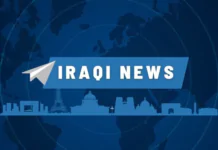Internal Audit Directorate Tasks
October 13, 2025 The Internal Audit Directorate is one of the main pillars in promoting good governance and corporate oversight at the Central Bank of Iraq.
Through its independent and objective assurance and advisory activities, it assists management in improving its operations and fulfilling its responsibilities efficiently and effectively.
This is achieved by verifying the soundness and integrity of the Bank’s various activities and the extent of their compliance with and adherence to established laws, regulations, instructions, policies and plans.
It also assists the Bank in achieving its objectives by evaluating and improving the effectiveness of risk management, internal control and governance.
The Directorate‘s work is based on the Internal Audit Charter and the Central Bank‘s strategy.
It is administratively linked to the Governor and technically to the Audit Committee emanating from the Bank‘s Board of Directors.
The approach taken
The Internal Audit Directorate of the Central Bank of Iraq is committed to implementing the international standards issued by the Institute of Internal Auditors (IIA).
It operates with complete independence to ensure the objectivity of results and the quality of reports, contributing to achieving the highest levels of efficiency and transparency.
This is achieved through an annual audit plan prepared in accordance with the core internal audit services of confirmatory tasks and providing advice and consultations with the aim of adding value to the bank‘s business.
First: Confirmatory tasks
Ensure that all Central Bank departments comply with approved laws, instructions, policies and procedures.
Evaluating and improving the efficiency and effectiveness of regulatory controls and risk management, and ensuring the integration of operations with the bank’s strategic objectives.
Evaluating the efficiency and suitability of resources, and the extent to which they are optimally utilized.
Evaluating the reliability and validity of financial and accounting information.
Verify the existence of assets and the integrity of the means used to protect them.
Evaluating the efficiency, adequacy and suitability of electronic systems and technologies
in accordance with accepted standards and practices.
Evaluating the efficiency and effectiveness of the bank‘s cybersecurity procedures.
Evaluating the efficiency and effectiveness of operations performed by the bank‘s departments
Contribute to achieving the bank’s objectives through continuous evaluation of the efficiency and effectiveness of approved procedures and systems.
Second: Planning and consulting tasks
Preparing the annual risk-based internal audit plan and presenting it to the Audit Committee for approval.
Preparing and reviewing the internal audit charter.
Preparing reports on audit and evaluation results, submitting appropriate recommendations, and following up on their implementation.
Cooperating with external regulatory bodies, studying their comments, and providing appropriate responses.
Providing opinion and advice to management and organizational units on non-routine matters upon their request.
Contribute to internal investigations in accordance with approved methodologies and
as requested by senior management.
Participation in permanent and temporary committees and working groups in accordance with approved methodologies and in a manner that does not conflict with international standards for internal auditing.
Study and develop approved procedures in accordance with international standards for internal auditing. https://cbi.iq/news/view/3010
The Central Bank Begins The Actual Implementation Of The Comprehensive Banking Reform Project.
Samir Al-Nusairi The Central Bank‘s efforts and actions, in partnership and consultation with private banks, have been fruitful in facilitating the implementation of the objectives, programs, mechanisms, and standards of the comprehensive banking reform project, in cooperation with the government and the global consulting firm Oliver Wyman.
The primary objective is to build a sound, modern, comprehensive and flexible banking sector that will drive rapid growth in the national economy and contribute to achieving a cumulative increase in the gross domestic product and growth in the market value of the banking sector.
Given that economic reform begins with banking reform, the challenges facing the Iraqi economy and the opportunities for reform in the banking and financial sector are highlighted in the government’s program, as are the prospects of the Central Bank‘s future vision for the role of the banking sector in achieving sustainable development and investment, and the efforts currently being made to activate and revolutionize productive economic sectors other than oil, to diversify sources of national income and achieve financial sustainability and rapid growth for the national economy.
The Central Bank‘s role in regulating foreign trade financing and completing infrastructure projects to achieve comprehensive digital transformation and expand the use of electronic payment tools to achieve financial inclusion will contribute to providing opportunities for reform, development, empowerment, growth of the private banking sector during 2025-2028, as follows:
First: Developing the Iraqi banking system and its compliance with international banking and accounting standards.
Second: Building a solid, modern, comprehensive and flexible banking sector.
Third: Enhancing citizens’ confidence in the banking sector locally and internationally, and acknowledging its transparency, progress, and strict commitment to international standards, and gaining the trust of reputable correspondent banks to deal with it.
Fourth: Rehabilitating restricted and weak banks to return to activity in the banking market with full internal and external activities.
Fifth: Converting banks to their primary function, which is financing and bank lending development. Enhancing financial inclusion and ncreasing its current rate as planned.
Sixth: Strengthening the procedures and decisions for the transition from a cash economy to a digital economy, withdrawing funds outside the banking cycle, which constitute approximately 80%, and introducing them into the banking system.
Although all the above objectives have a three-year implementation period according to the banking reform project and the Central Bank strategy, what has been achieved in 2023 and 2024 and up to 6/30/2025 in terms of building foundations, rules and pillars that have formed a supporting pillar in building the mechanisms and paths of the desired reforms, and they constitute ambitious percentages as announced, which will lead to the evaluation and classification of banks based on their achievement of the planned objectives in the reform Project according to the internationally approved standards and criteria. https://economy-news.net/content.php?id=61086
Iraq’s Central Bank Boosts Financial Transformation Through Strategic Programs
Iraq Amr Salem October 13, 2025 944 The new headquarters of the Central bank of Iraq (CBI). Baghdad (IraqiNews.com) – The Prime Minister’s Advisor for Banking Affairs, Saleh Mahoud, confirmed on Saturday that the Central Bank of Iraq (CBI) is moving forward with three strategic programs to advance financial transformation.
Mahoud told the state-run news agency (INA) that the CBI is currently working on three important initiatives, which are the local electronic card, express payment, and the billing system.
The CBI currently has timetables for completing these three initiatives to ensure a progressive increase in financial inclusion levels, according to Mahoud.
The Iraqi official added that Iraq frequently benefits from international expertise, particularly in the banking sector and digital transformation.
CBI Governor Ali al-Alaq revealed on Thursday that the bank has received approximately 80 applications to create digital banks in the country.
Oliver Wyman, a leading international management consulting firm, is reviewing the criteria set by the CBI to issue licenses for digital banks in the country, according to al-Alaq.
Al-Alaq said earlier that digital banks signify a change in orientation toward an approach that is entirely consistent with technological advancements and their application to a range of operations.
The Iraqi official indicated that digital banks’ annual financial transaction volume has reached around $5 trillion and is expected to reach roughly $7 trillion by 2027.
Artificial intelligence,encryption, andbig data analytics are examples of cutting-edge technology that have fueled the rise of digital banks.
The licensing of digital banks is a critical first step in incorporating these cutting-edge technologies into Iraq’s banking system, with the goal of improving client financial services and promoting innovation and industry competitiveness.
https://www.iraqinews.com/iraq/iraqs-central-bank-boosts-financial-transformation-through-strategic-programs/
For current and reliable Iraqi news please visit: https://www.bondladyscorner.com






